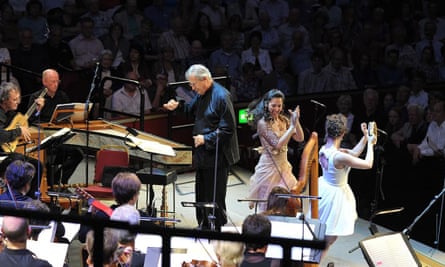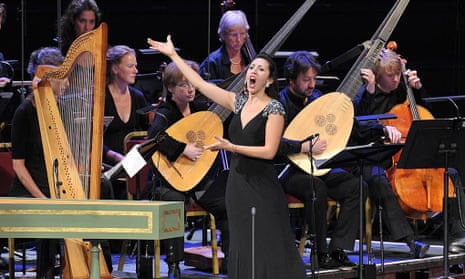Hearing Monteverdi’s Orfeo, John Eliot Gardiner says, is “potentially to be exposed to music’s power in one of its rawest, most concentrated forms”. The composer’s output has, of course, been central to Gardiner’s own work since he formed the Monteverdi Choir more than 50 years ago, and his recording of opera’s earliest masterpiece is regarded as a benchmark achievement by many. His Prom performance didn’t quite scale comparable heights, despite its often remarkable musical beauty. If raw, concentrated emotion was the aim, it was not quite achieved, largely thanks to an awkward semi-staging, for which no director was credited, and which sometimes got in the way.
Orfeo (charismatic Polish tenor Krystian Adam) was pitted against a figure played by bass Gianluca Buratto, cast as both Charon and Pluto, but gradually emerging as the embodiment of implacable destiny. Beating out the rhythm of the opening fanfares on a drum, he led the singers on to the platform. Later, his drumming was the source of the unspecified noise that so disquiets Orfeo that he fatally looks back at Eurydice (Mariana Flores) as they return from Hades. During the final moresca, he homed in on Flores as if claiming her as his own.

Attempts to use the space of the Albert Hall occasionally created a sense of distance, rather than bridging the gap between performers and audience. Francesca Aspromonte’s Messenger announced Eurydice’s death while weaving her way through the promenaders in the arena, resulting in jolts of focus and balance when least needed. There was a lot of extraneous movement as the chorus left and returned to the platform to change from their party gear for the pastoral scenes into sober black for Hades. Something simpler and stiller would have been altogether more effective.
But it was beautifully sung. Adam’s warm, sweet tone speaks volumes:
act three’s Possente Spirto, Orfeo’s great apostrophe to Charon, and his act five lament were flawlessly done, and achingly moving. Some might prefer a darker sound than Aspromonte’s silvery soprano as the Messenger, but the series of pianissimos with which she contemplated eventual solitude was breathtaking. Buratto sounded suitably cavernous, and generated considerable sensual charge with Francesca Boncompagni’s dignified, loving Proserpina .
Gardiner remains wonderfully alert to the joys and sorrows of this music, and the playing from the English Baroque Soloists was admirably sensuous and detailed, the choral singing finely honed, wonderfully committed and infinitely expressive.
- The Proms continue until 12 September. Box office: 0845 401 5040.

Comments (…)
Sign in or create your Guardian account to join the discussion